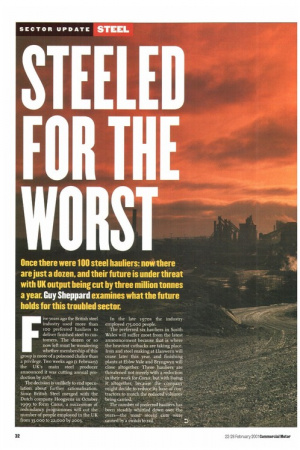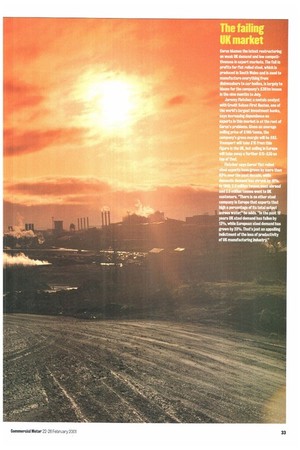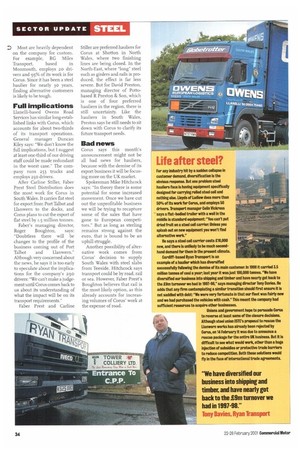Once there were 100 steel hauliers: now there are just
Page 34

Page 35

Page 36

If you've noticed an error in this article please click here to report it so we can fix it.
a dozen, and their future is under threat with UK output being cut by three million tonnes a year, Guy Sheppard examines what the future holds for this troubled sector.
IF, ive years ago the British steel industry used more than Do° preferred hauliers to deliver finished steel to customers. The dozen or so now left must be wondering whether membership of this group is more of a poisoned chalice than a privilege. Two weeks ago (I February) the UK's main steel producer announced it was cutting annual production by zo%.
The decision is unlikely to end speculation about further rationalisation. Since British Steel merged with the Dutch company Hoogvens in October 1999 to form Corus, a succession of redundancy programmes will cut the number of people employed in the UK from 33,000 to 22,000 by 2003.
In the late 1970s the industryemployed 175,000 people.
The preferred six hauliers in Smith Wales will suffer most from the latest announcement because that is where the heaviest cutbacks are taking place. Iron and steel making at Llanwern will cease later this year, and finishing plants at Ebbw Vale and Bryngwyn will close altogether. These hauliers are threatened not merely with a reduction in their work for Carus, but With losing it altogether, because the company might decide to reduce its base of Contractors to match the reduced volumes being carried. • The number of preferred hauliers has been steadily whittled down over the years—the . most recent cuts were caused by a switch to rail., Corns blames the latest restructuring on weak UK demand and low competitiveness in export markets. The faN in profits for flat rolled steel, which is produced in South Wales and is used to manufacture everything from dishwashers to car bodies, is largely to blame for the companys5301m losses In the nine months to July.
Jeremy Fletcher} a metals analyst with Great Suisse First Boston, one of the world's largest Investment banks, says increasing dependence on exports Intl* market is at the root of Corte's problems. Given an average suing price of 11116/tonne, the coinpanys gross margin will be 163. limumert will take £15 from Us figure lathe UN, but selling in Europe will fake away a further115-130 on Wet that.
Fletcher says Crave fiat roiled steel exports have grown by more than 63% over the past decade, while domestic Itt1989, 2 abroad and 3.5 million tonnes wont to UK customers. "There is no other steel company In Europe that exports that high a percentage of Its total output across water" he adds. in the past 12 years UK steel demand has fallen by 13%, while European steel demand has grown by 23%. That's just an appalling indictment of the loss of productivity of UK manufacturing industry."
D Most are heavily dependent on the company for custom. For example, RG Miles
Transport, based in Monmouth, employs zo drivers and 95% of its work is for Corus. Since it has been a steel haulier for nearly 30 years, finding alternative customers is likely to be tough.
Full Implications
Llanelli-based Owens Road Services has similar long-established links with Corus, which accounts for about two-thirds of its transport operations. General manager Duncan Kiley says: "We don't know the full implications, but I suggest at least one-third of our driving staff could be made redundant in the worst case." The company runs 253 trucks and employs 250 drivers.
After Canine Stiller, Faber Prest Steel Distribution does the most work for Corus in South Wales. It carries flat steel for export from Port Talbot and Llanwern to the docks, and Corns plans to cut the export of flat steel by 1.5 million tonnes.
Faber's managing director, Roger Boughton, says: "Doubtless there will be changes to the profile of the business coming out of Port Talbot and Uanwern." Although very concerned about the news, he says it is too early to speculate about the implications for the company's 290 drivers: "We can't make a judgement until Corus comes back to us about its understanding of what the impact will be on its transport requirements."
Faber Prest and Carline Stiller are preferred hauliers for Corus at Shotton in North Wales, where two finishing lines are being closed. In the North-East, where "long" steel such as girders and rails is produced, the effect is far less severe. But for David Preston, managing director of Pottobased R Preston & Son, which is one of four preferred hauliers in the region, there is still uncertainty. Like the hauliers in South Wales, Preston says he still needs to sit down with Corus to clarify its future transport needs.
Bad news
Corns says this month's announcement might not be all bad news for hauliers, because with the demise of its export business it will be focusing more on the UK market.
Spokesman Mike Hitchcock says: "In theory there is some potential for some increased movement. Once we have cut out the unprofitable business we will be trying to recapture some of the sales that have gone to European competitors." But as long as sterling remains strong against the euro, that is bound to be an uphill struggle.
Another possibility of alternative work comes from Corns' decision to supply South Wales with steel slabs from Teeside. Hitchcock says transport could be by road, rail or sea. However, Faber Prest's Boughton believes that rail is the most likely option, as this already accounts for increasing volumes of Corus' work at the expense of road.




































































































